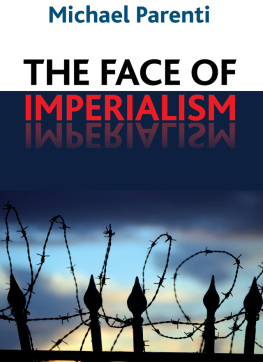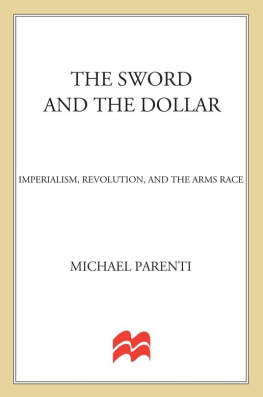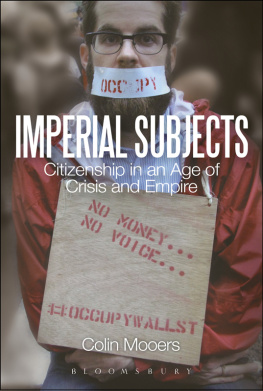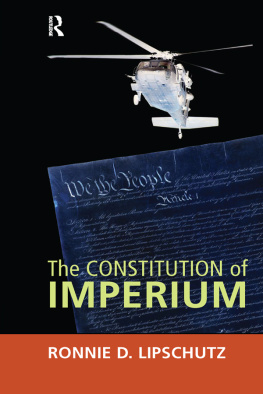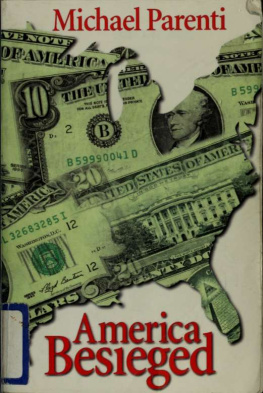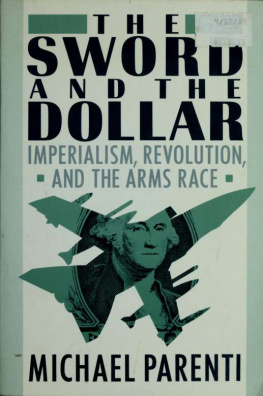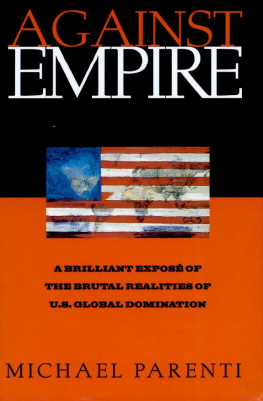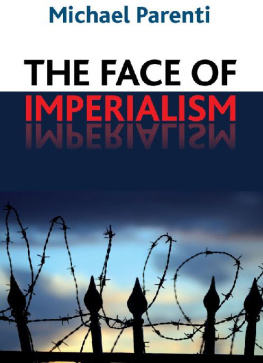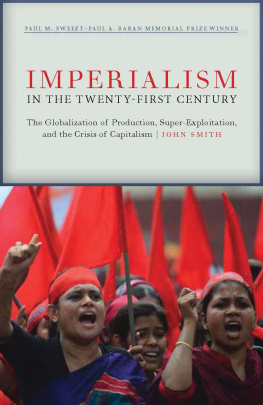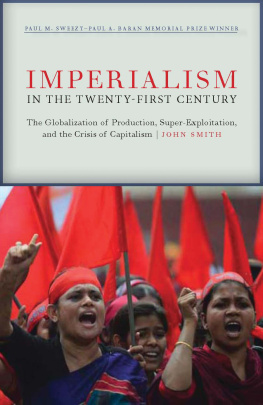THE FACE OF IMPERIALISM
The Face of Imperialism
Michael Parenti
First published 2011
by Paradigm Publishers
Published 2016
by Routledge
2 Park Square, Milton Park, Abingdon, Oxon OX14 4RN
711 Third Avenue, New York, NY 10017, USA
Routledge is an imprint of the Taylor & Francis Group, an informa business
Copyright 2011, Taylor & Francis.
All rights reserved. No part of this book may be reprinted or reproduced or utilised in any form or by any electronic, mechanical, or other means, now known or hereafter invented, including photocopying and recording, or in any information storage or retrieval system, without permission in writing from the publishers.
Notice:
Product or corporate names may be trademarks or registered trademarks, and are used only for identification and explanation without intent to infringe.
Library of Congress Cataloging-in-Publication Data
Parenti, Michael, 1933
The face of imperialism / Michael Parenti.
p. cm.
Includes bibliographical references and index.
ISBN 978-1-59451-917-8 (hardcover: alk. paper) ISBN 978-1-59451-918-5 (pbk.:
alk. paper)
1. Imperialism. 2. United StatesForeign relations1989- I. Title.
JC359.P34 2011
325'.320973dc22
2010047856
Designed and Typeset by Straight Creek Bookmakers.
ISBN 13: 978-1-59451-918-5 (pbk)
ISBN 13: 978-1-59451-917-8 (hbk)
But who can live for long
In an euphoric dream;
Out of the mirror they stare,
Imperialisms face
And the international wrong.
W. H. Auden
Contents
1
Thinking About Empire
IN THIS AGE OF EMPIRE, how do we arrive at the truth? Many of our political perceptions are shaped by culturally prefigured templates implanted in our minds without our conscious awareness. To become critically aware of these ingrained opinions and images is not only an act of self-education; it is an act of self-defense. This seems especially true when dealing with matters of global impact, such as the nature of empire.
Orthodoxy as "Objectivity"
In 1932, Carl Becker was among the first to give currency to the phrase the climate of opinion. Becker argued that ideas and notions about reality do not spring forth from the mind in a social vacuum. They are pursued because they seem to fit into the ongoing climate of opinion.They reinforce each other, gaining acceptance through circulation and repetition. The notions that fit into the prevailing climate of opinion are more likely to be accepted as objective, while those that clash with it are usually seen as beyond the pale and lacking in credibility. So, more often than we realize, we accept or decline an idea, depending on its acceptability within the ongoing opinion climate.
In other words, the mental selectors we use to organize our perceptions are not mostly of our own creation. Much about our personal perception is not all that personal; rather, it is shaped by a variety of forces and conditions outside ourselves, such as the dominant ideology (or dominant paradigm), the conventional social values, ones position in the social structure, the available flow of information and disinformation, and the potential benefits and losses attached to the perceptions and pronouncements one makes. On that last point it is obbligato to reference Upton Sinclairs remark: It is difficult to get a man to understand something, when his salary depends upon his not understanding it.
If what we call objectivity is really little more than a conformity of mainstream bias, then isnt one paradigm about as reliableor unreliableas another? Is all truth, then, nothing more than opinion and belief? If not, what makes a heterodox analysis better than an orthodox one?
First, radical views that are outside the mainstream generally (but not always) are more reliable than the dominant view because they are more regularly challenged and tested against evidence. They do not get to float freely down the mainstream. They cannot rest on the orthodox power to foreclose dissent, and they are not supported by the unanimity of bias that passes for objectivity.
Second, we can value an opinion by the function(s) it serves. The heterodox view has a special task: to contest the prevailing orthodoxy, to broaden the boundaries of debate, to wake people up, to unearth suppressed data. The function of orthodox or conventional opinion is just the opposite: to keep the parameters of discourse as narrow as possible, to dismiss evidence that ill fits the dominant paradigm. Hence, all opinions are not of the same value. It depends on what they are being used for, what interests they serve.
We have all observed that if something does not fit what people believe, they marshal their reserve defenses. Rarely when faced with contrary evidence do they discard their preciously held beliefs. And if they cannot challenge the validity of what confronts them, they have fallback positions that explain to their satisfaction the data that do not fit the pictures in their heads.
When the orthodox view becomes so entrenched, evidence becomes irrelevant.
Broaching certain subjects casts doubt on the credibility and sanity of the dissident who dares to raise a question. Consider such inflammatory topics as: the legitimacy of the 2004 presidential election in the United States, the Shangri-La image of Tibet before the Chinese invasion, the findings of the Warren Commission regarding the assassination of President John Kennedy, the number of people killed by this or that tyrant, the Clinton/NATO/CIA war against Yugoslavia, the unanswered questions of the 9/11 Commission, a class power analysis of the American political system, and the absence of political-economic content in public policy debates.
Such topics raise issues that cross the boundary of allowable opinion. They move into forbidden terrain and are therefore dismissed out of hand, denied the opportunity for rational discourse. Through a process of immediate assertion and intensive repetition, the universe of discourse is preempted and monopolized. This is one way the dominant paradigm is maintained. One crosses the lines beyond permissible opinion only at a risk to ones intellectual reputation or even ones career.
The Myth of Innocent Empires
The presence of self-legitimating ideological boundaries is evident in the discussion about empire. When writing a book about ancient Rome, I discovered that much of the historic literature on empire is rather favorable. Empires have been hailed as grand accomplishments, bringing stability and peace where before there had been only squabbling tribes. We even give empires laudatory peace names, such as Pax Romana and Pax Britannica.
Empires also are sometimes seen as innocent unintentional accretions that arise stochasticallythat is, by chance, without benefit of any kind of conspiratorial planning or even consistent causality. Years ago we used to hear that the British Empire was put together in a fit of absentmindedness. More recently, four months after the United States invaded Iraq, and referring to that event, The Economist, a conservative British publication, wrote, Empires are born in funny ways, and sometimes via the law of unintended consequences by accident.
In fact, empires are not innocent, absent-minded, accidental accretions. They are given purposive direction by rulers who consciously mobilize vast amounts of personnel and materials in order to plunder other lands and peoples. The British, for instance, did not just happen to find themselves in India. They pushed their way in with all deliberate force and rapacious intent. The Americans did not just mistakenly stumble into Iraq because of some misinformation that the Iraqis were linked to Al Qaeda and possessed weapons of mass destruction. The White House coterie that pursued war had been calling for intervention against Iraq for at least a year before the 2001 attack on the World Trade Center, and well before there was ever any thought of Al Qaeda terrorist networks in Baghdad or Iraqi weapons of mass destruction.

